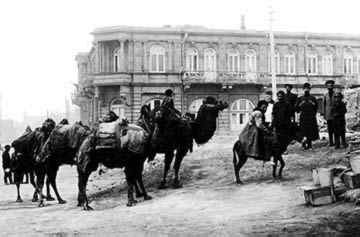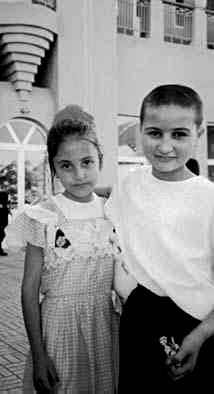|
Tracing Roots
to Baku
Igor Effimoff is not the kind of person that you would expect to have roots in Baku. He's tall, fair-complexioned and of Russian-Polish descent. He grew up in Iran but could easily pass for an American. Effimoff's connection to Baku is through his grandfather, who moved there during the late 19th-century Oil Boom and started paraffin extraction and candle-making factories. During the Bolshevik Revolution, the grandfather had to flee with his family to Iran. Today, his grandson is back in Baku, working in the oil industry and researching his family history. Here Effimoff writes about his search for more information about his past, a search that turns up more questions than answers.
Unfortunately, by the time I stepped up my quest to know, I had squandered so many opportunities. The older generation had passed away, and political disruptions throughout the region-both in the Soviet Union and in Iran-had resulted in the loss or destruction of many of the historical records and documents. By the late 1980s when I was living in the United States, I had about given up. But then, the unthinkable happened, and the Soviet Union collapsed, and people began developing relations with those who had once lived behind that "Iron Curtain" that had isolated them for so many decades. My work in the oil business took me to the Former Soviet Union (FSU) on several occasions, though never to Baku. Then in 1996, Pennzoil approached me and asked me to represent them in Azerbaijan. I figured, "Why not?" I knew the company had an excellent reputation, and I might get a chance to pursue my roots as well. Career-wise, however, it probably meant a step or two backwards. My wife, Betty, an American who grew up in the Cincinnati region of southern Ohio, sensed my interest in coming to Baku and was very understanding. Over the years she has come to realize that I have always had one foot in the East and the other in the West, and that I have a compelling need to know more about my past. We thought this might be the chance. Facts Pieced Together I never got to know my grandfather Anatoli personally. He passed away before I was born. He was an ethnic Russian who spelled his name the pre-Soviet way-Effimoff-just like some of the brand names which are so familiar today-Romanoff and Smirnoff with "-off" (instead of "ov"). Grandfather came to Baku in the latter part of the 19th century. He was a chemist by profession and, undoubtedly, had been attracted by the incipient oil boom. It seems he soon found good use for his chemistry skills and established a plant in what was then, and still is, known as "Black City" (the industrial part of Baku where much of the oil was being drilled and processed at the time). The oil on the Absheron Peninsula (where Baku is located) contains paraffin. Through a distillation process, my grandfather stripped the paraffin from the oil, which left a substance that, when purified, becomes wax. It was then mixed with stearic acid (a solid fatty acid) and various other substances. The wax was then sold in various forms for a number of purposes. At the time, one of the more important uses was the manufacturing of candles, which were made by dipping or molding them into various shapes. Candles, of course, were in great demand prior to the invention and widespread use of electricity. My grandfather apparently had a candle factory and also exported wax to Iran. He must have been quite a good businessman, though in personal matters, especially related to the family, he was known to be rather strict and difficult to live with. My father Yevgeni was born in 1905 in Baku. He used to tell me stories of how my grandfather would make him work at the family's plants during holidays so that he would learn the value of a "kapeyka" (Russian kopeck-smallest unit of currency). It didn't seem to matter that our family was fairly well-to-do. To tell you the truth, I've never been able to figure out whether my grandfather was actually that severe, or my father was very mischievous and thus required disciplining. I rather suspect the latter. My mother, of Polish origin, arrived in Tehran towards the end of World War II. She met my father there, and they got married. I was born in 1946. I grew up and completed my high school studies in Iran; then in 1964, I left to "make my fortune." Eventually, I ended up in the United States where I got my Ph.D. in geology. On rare occasions, my father spoke to me about his past, telling me about Baku's famed medieval walled city-the old "Inner City" (Ichari Shahar). He mentioned the "Boulevard," where people used to stroll (and still do) in the evenings down by the sea. According to him, there were lavish parties at the family house. Basically, he had grown up in a privileged life of relative ease. That lifestyle ended abruptly in April 1920 when the Bolshevik army entered Baku. Identified as part of the "bourgeoisie", our family was targeted for their wealth and no longer welcome. Some family members, it seems, were killed, and my grandfather, grandmother and father fled hastily to Tehran where my grandfather had previous business contacts. I don't know how they fled. All I know is that it was in a great hurry, and that somehow they managed to take out a chest full of valuables, the proceeds of which my grandmother succeeded in living off for a number of years. The shock of losing everything virtually overnight was too much for my grandfather. He died shortly afterward of a "broken heart"-a terminal physical condition known as "qubarlanib olmek" in Azeri. My father, still in his youth, continued his university studies in Iran and later went to France where he studied engineering. The shock of leaving Baku, which led to my grandfather's death, also had a profound psychological effect on both my grandmother and father. Neither of them cared to talk about the past. It disturbed them too much, they said. Actually, I've encountered this same attitude among many of the émigrés in Tehran and elsewhere in the world. When conversations turn to the past, they cut the discussion short, saying, "Let's talk about more pleasant things." Throughout our home in Tehran, we had many family photos that dated back to Baku days. But when the Shah of Iran fell in 1979, my father and mother fled again. This time they left those mementos behind, too. Who knows where any of that stuff might be today, or if it even exists? It was the second time in my father's life that he had abandoned nearly everything he owned. My dad was 74 at the time-a tough age to have to start all over again. Not Enough Clues When I arrived in Baku in 1996, I almost immediately set out to try to find some concrete evidence of my family's roots. To tell you the truth, it hasn't been simple or gone as smoothly as I would have hoped. I'm always afraid that because my original information is so sketchy, I might be building a scenario that is actually more fiction than fact. There's always a tendency for family histories to become sanitized, glorified and augmented over time. "Revisionism" can take place on the personal family level just as it does on the national level. I've heard stories among émigré families where every ancestor was a count or a duke! When I tried to find out where my family might have resided in Baku, I discovered that the archival system is organized in such a way that one has to know the street address to determine the occupants of a specific address. Family name alone does not generate the desired information. The process is somewhat analogous to trying to find out how to spell a word by looking it up in the dictionary when you don't know how it's spelled in the first place. It's almost a hopeless exercise! I have been a bit successful in terms of my grandfather's business, although there seems to be no physical evidence left of my grandfather's paraffin plant. Of course, with the advent of the widespread use of electricity, candles quickly became obsolete. No doubt his factory was razed to make room for other industries. The "Black City" has undergone enormous transformations since the turn of the century. The Nobel Brothers' residence still stands there, but it's gutted inside and not open to the public. I was able to find an old phone book with a phone number and an indirect reference to the plant. To research and navigate through the archives, one needs details and a "road map"-I lacked the necessary details. I also discovered that although the pre-1920 archives are quite impressive, they are not comprehensive. The Bolsheviks apparently destroyed a good many of the records; there has been chaos and attendant indifference to records from time to time. Add to that the usual arch-enemies of archival material-accidents, fire, water, rats, mold, discoloration, heat and time-which have all taken their toll as well. I've come to the conclusion that although I speak Russian, the job requires a professional researcher, not an amateur like me. I hope to retain such a person, provide him with the few clues that I have about the past, and turn him loose to do detective work both in Baku and St. Petersburg, where I understand a complete duplicate set of Baku's archives exist.
From Azerbaijan International (7.3) Autumn 1999. © Azerbaijan International 1998. All rights reserved. Back to Index AI 7.3 (Autumn 99) AI Home | Magazine Choice | Topics | Store | Contact us |



